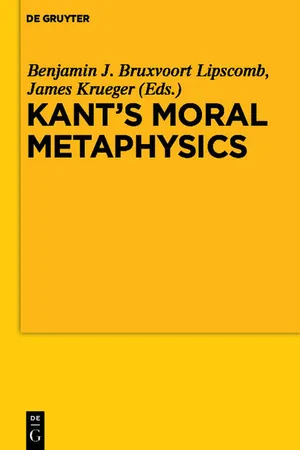
Kant’s Moral Metaphysics
God, Freedom, and Immortality
- 340 pages
- English
- PDF
- Available on iOS & Android
About this book
Morality has traditionally been understood to be tied to certain metaphysical beliefs: notably, in the freedom of human persons (to choose right or wrong courses of action), in a god (or gods) who serve(s) as judge(s) of moral character, and in an afterlife as the locus of a "final judgment" on individual behavior. Some scholars read the history of moral philosophy as a gradual disentangling of our moral commitments from such beliefs. Kant is often given an important place in their narratives, despite the fact that Kant himself asserts that some of such beliefs are necessary (necessary, at least, from the practical point of view). Many contemporary neo-Kantian moral philosophers have embraced these "disentangling" narratives or, at any rate, have minimized the connection of Kant's practical philosophy with controversial metaphysical commitments ? even with Kant's transcendental idealism. This volume re-evaluates those interpretations. It is arguably the first collection to systematically explore the metaphysical commitments central to Kant's practical philosophy, and thus the connections between Kantian ethics, his philosophy of religion, and his epistemological claims concerning our knowledge of the supersensible.
Frequently asked questions
- Essential is ideal for learners and professionals who enjoy exploring a wide range of subjects. Access the Essential Library with 800,000+ trusted titles and best-sellers across business, personal growth, and the humanities. Includes unlimited reading time and Standard Read Aloud voice.
- Complete: Perfect for advanced learners and researchers needing full, unrestricted access. Unlock 1.4M+ books across hundreds of subjects, including academic and specialized titles. The Complete Plan also includes advanced features like Premium Read Aloud and Research Assistant.
Please note we cannot support devices running on iOS 13 and Android 7 or earlier. Learn more about using the app.
Information
Table of contents
- Frontmatter
- Table of Contents
- Introduction
- CHAPTER 1. Reality, Reason, and Religion in the Development of Kant's Ethics
- CHAPTER 2. Moral Imperfection and Moral Phenomenology in Kant
- CHAPTER 3. Two Standpoints and the Problem of Moral Anthropology
- CHAPTER 4. In Search of the Phenomenal Face of Freedom
- CHAPTER 5. Something to Love: Kant and the Faith of Reason
- CHAPTER 6. Duties, Ends and the Divine Corporation
- CHAPTER 7. Real Repugnance and Belief about Things-in-Themselves: A Problem and Kant’s Three Solutions
- CHAPTER 8. Practical Cognition, Intuition, and the Fact of Reason
- CHAPTER 9. Kant’s Reidianism: The Role of Common Sense in Kant’s Epistemology of Religious Belief
- CHAPTER 10. Kant on the Hiddenness of God
- CHAPTER 11. Kant’s Account of Practical Fanaticism
- Backmatter